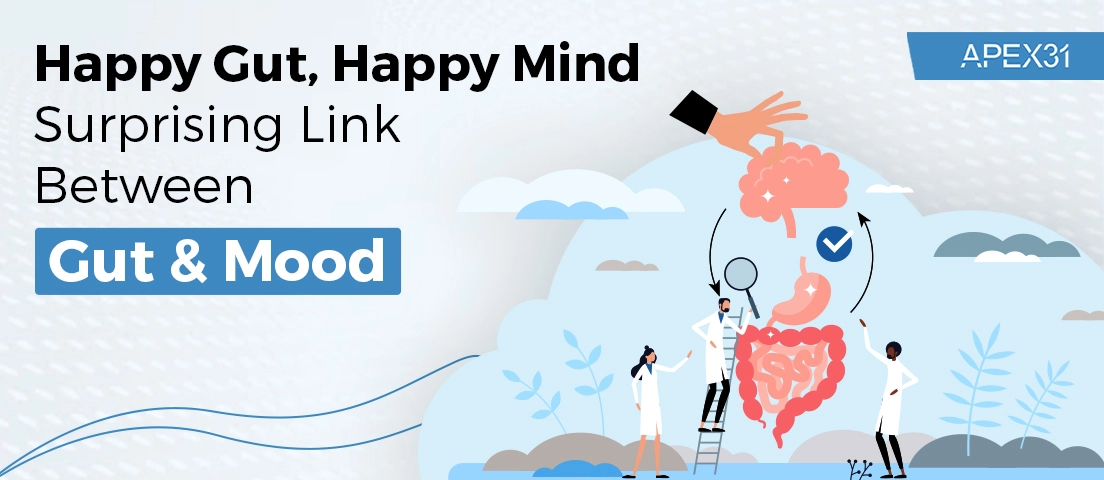Happy Gut, Happy Mind: Surprising Link Between Gut & Mood

The gut and mind connection is so strong that it can even challenge the traditional view of mental health being a matter of just the brain.
There has been a lot of research lately that reveals that our gut microbiome is an important factor in mental health. It influences not just our mood but stress levels and cognitive functions as well.
You shouldn’t think of your gut as just a digestive organ but as your body’s second brain, which regularly communicates with the first. In fact, a healthy gut is the cornerstone of a balanced mind.
In this blog post, you’ll learn about the factors that disrupt this vital ecosystem and much more. So, let’s get going!
The Impact of Diet on Your Gut Microbiome
You would be surprised to know that the impact of your diet is quite profound when you think about the gut microbiome. Our diet is a big influencer of the whole internal ecosystem.
A diet that has processed foods, refined sugars, and even unhealthy fats can create an environment in which the harmful bacteria thrive, which can outcompete the beneficial ones. If you want to reverse this situation, you must do the following:-
Consume a diet that consists of whole food items, which can support microbial diversity.
Fermented food items such as yogurt and kimchi can help introduce beneficial bacteria directly into the gut, so double down on them.
Be hydrated as much as you can because water will help maintain the health of your digestive tract.
Antibiotics: A Two-Sided Coin for Gut Health
Antibiotics have literally saved millions of lives by fighting bacterial infections. But they can be a double-edged sword when it comes to gut health.
They can be a powerful tool against harmful bacteria, but they can even get rid of the good bacteria in the gut. This microbial disruption can have a huge impact on the gut ecosystem, which can lead to long-term imbalances which can affect mental well-being as well.
You should understand that restoring the gut once the consumption of an antibiotic is crucial. It can be done by eating a diet that is rich in probiotics and prebiotics.
The Stress-Gut Connection
Stress has become an inseparable part of modern life, but its harmful effects affect not just our mental health. If you take the case of chronic stress, it has a profound and immediate impact on the gut microbiome.
The brain and gut are in regular communication, all thanks to the gut-brain axis. The stress signals from the brain can even affect the gut’s mobility, along with the composition of its microbial communities.
Some of the activities that you can do to reduce your stress and improve your gut condition are as follows:-
Engage in regular yoga, at least 5 days a week.
Have meditation sessions of 10-15 minutes each, almost on a daily basis.
Spend as much time in nature as you can, like visiting the city park or going for a trek.
Sleep Deprivation & Its Consequences
You might think that sleep is just for our bodies to get rest and recharge for the next day. But it is also an important time period for maintaining the health of our gut microbiome.
If you have poor sleep habits and chronic sleep deprivation, your body’s internal clock can be jeopardized. This disruption in the circadian rhythm can make you feel tired, and it can also impact the balance and composition of the gut bacteria.
In fact, the gut bacteria have a circadian rhythm of their own and low-quality sleep can hamper it substantially.
Two approaches that you can follow to fix your sleep deprivation and gut health are as follows:-
- Create a consistent sleep schedule.
- Have a calming bedtime routine.
The Role of Environmental Toxins
There’s a huge variety of environmental toxins that we’re exposed to, and there has been a lot of research that reveals their effects on our gut microbiome.
One of the most-researched toxins is glyphosate, which is a commonly used herbicide. There have been several studies that show that glyphosate can disrupt the delicate equilibrium of gut bacteria.
You must know that these environmental toxins don’t just get rid of weeds but also disrupt the communication pathways that are present within the gut. They can even lead to inflammation and impaired function. Here’s how you can combat it:-
Reduce exposure to pesticides and other chemicals to improve your gut health.
Eat organic food and increase the intake of detox-supporting foods to lessen the impact of environmental toxins.
Sedentary Lifestyle & Gut Diversity
The connection between physical activity and mental health is clearly established, but the role of exercise can often get overlooked in nurturing our gut microbiome. A sedentary lifestyle can not just affect our cardiovascular health, but also the gut bacteria as well.
There have been many studies that show that people who are physical active have a lot more diverse and healthier gut microbiome as compared to those who are sedentary.
Exercise increases the production of beneficial bacteria and promotes the production of short-chain fatty acids (SCFAs). These are crucial for a healthy gut lining and reduced inflammation.
A sedentary lifestyle can create a less favourable environment for these beneficial microbes to survive. This lack of microbial diversity can damage the gut’s ability to have proper communication with the brain, which can cause mood disorders.
If you want to flip the script, you must do the following:-
Have a physical activity regimen to reduce inflammation throughout your body, including in the gut.
Regular exercising in the form of a daily walk can have a great effect on the gut-brain axis.
Wrapping Up
By now, you must have understood that the gut microbiome is a lot more than a digestive powerhouse. In fact, it is an important player in our mental health. The factors which can disrupt this delicate ecosystem can also impact our mood and overall mental well-being.
By knowing about the intricate biological mechanisms which connect our gut and brain, you will be able to learn how you can achieve holistic health. The true way to achieve a balanced mind begins with a happy and healthy gut.
Having a lifestyle which supports our microbial friends with the help of a diverse diet, stress management, and physical activity can go a long way. So, take the plunge and take care of your gut to keep your mind happy and body healthy.



